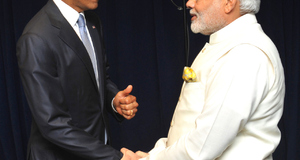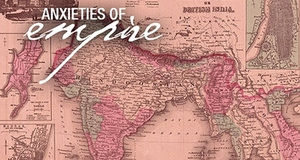Featured Article:Two Roadmaps for Kashmiri DemocracyOn the Trail of Peace and DemocracyIn light of the aforementioned IR theories, what do the two roadmaps at hand imply for the futures of India, Pakistan, and, above all, the Kashmiri people? To a large extent, the JKLF’s plan for a fully independent Kashmiri state is contingent upon the UN’s willingness to mediate fairly between the different parties involved in the dispute. When it comes to the Kashmir question, the UN’s effectiveness in implementing solutions since the conflict’s inception is questionable at best. Perhaps the most prominent example of this is the UN Commission’s 1949 call for a “free and impartial plebiscite” to determine the fate of Kashmir, which has yet to be answered. In an era in which India borders on superpower status and international organizations have to be careful not to irk the ire of Islamic nations – let alone a nuclear state like Pakistan – is the UN any more likely to drive Kashmir’s transformation than it was sixty years ago? Rhetorical intonations aside, the actual answer to this question relates closely to a number of constructivist concepts, especially “the fixing of meanings and the construction of identities” (Barnett, 2011, p. 157).The ability of states to define norms or enjoy the rewards associated with norm definition is by no means distributed equally. As the UN has an increasingly difficult time denying India a permanent seat on the Security Council, Indian officials are likely to exercise their ever-growing ability to set and/or modify the UN’s agenda; the more conservative members of the Indian government are particularly unlikely to want to give up a region so deeply entrenched in the history of the Indian state itself. The UN can also only do so much when it comes to issues that fall within the near-sacred realist sphere of domestic sovereignty. As a counterpoint to the probability that Indian policymakers will twist the UN’s arm to serve their own interests in Kashmir, India and Pakistan could take up the position assumed by normative IR theorists who critique the existence and validity of international standards and prescriptions: with a host of more pressing and current issues waiting to be addressed by the UN, India and Pakistan may well be able to turn a blind eye to or even actively undermine the IKC’s recommendations. While the JKLF should be wary of its reliance on the UN to transform Kashmir, the ramifications of its roadmap for South Asia cohere with the arguably tried and tested liberal institution of collective security. Countless political commentators have affirmed that a resolution of the Kashmir dispute would go a long way towards improving ties between India and Pakistan. Given the animosity that has defined the relationship between India, Pakistan, and Kashmir for so long, friendly relations between the three entities would advance the security priorities of all governments concerned and most likely improve standards of living and quality of life, particularly for the Kashmiri people. To bring Inayatullah’s ideas into the fold, the establishment of not one but many bridges of friendship between the different parties concerned would greatly decrease the probability for a “failed” South Asian future precipitated by nuclear conflict (2008, p. 66). In keeping with Inayatullah’s article, the JKLF appears to be advocating for a kind of Community Future for Kashmir through the creation of a unified, fully independent, and secular Kashmiri state. This model, in turn, relies on a Gandhian brand of ethical cosmopolitanism, as a result of which the citizens of the proposed state would have to view each other as moral agents with equal rights and responsibilities toward one another. Needless to say, these are high hopes for two regions increasingly distinguished by factionalism ever since the Line of Control was drawn in the sand. These hopes may well be dashed if the various ethnic and religious groups within the boundaries of the independent Kashmiri state begin to feel that their government is more secular in theory than in practice. Kashmir, however independent, is unlikely to flourish if independence simply internalizes the battle lines defined by colonial and postcolonial boundaries to date. In addition to questioning the wisdom of reunification, the prospect of Kashmiri statehood itself is problematic, to say the least. This assertion admittedly goes against the grain of most Kashmiri demands. Nonetheless, the state is undoubtedly a Western—and, more specifically, Westphalian—construct, one that debatably promotes rather than prevents conflict. If the IKC and its Kashmiri national government do not succeed in nullifying militancy in independent Kashmir, Kashmiri elements either dissatisfied with the prevailing state of affairs or spurred by years of pent-up agitation may see statehood as a licence to take back land or other resources they see as rightfully theirs. For that matter, the independent Kashmiri state itself may decide to act in this manner, although a populace scarred by decades of occupation would likely hesitate to “gain power at the expense of other states” (Dunne and Schmidt, 2011, p. 92). Regardless, any encroachments on Indian or Pakistani territory may give the South Asian nations the excuse they need to employ reactionary policies in the name of defensive realism. Of course, India and Pakistan may not wait to have an excuse to reoccupy parts of Kashmir, given the viability and feasibility of the offensive realist view alongside both nations’ longstanding hegemonic missions in the region. The potential problems of Kashmiri statehood do not automatically make the parliamentary delegation’s alternative the superior option. International actors can operate not only in accordance with theories but also under the banners of them. The second involves using the theory in question as an excuse rather than a sound justification for action, usually to pursue self-interested ends. In light of this, Indian administrators could operate under the banner of general realism to maintain the current oppressive status quo if Kashmir remains a part of India. Holding up the advancement and security of the Indian state as the “supreme good” (Dunne and Schmidt, 2011, p. 95), Indian forces could either continue to maintain a presence in Kashmir or reenter it at a given time for the sake of addressing an allegedly critical situation. Classical realists would probably contend that this kind of behavior is to be expected. They may well point to the length and bloody nature of the conflict as evidence that Indian authorities are driven by nothing less than natural tendencies to maintain an atmosphere of fear in Kashmir and act as though they are at war with the region (Dunne and Schmidt, 2011, p. 89). Escapism via the doctrine of double effect or consequentialist justifications of action would have the same basic end result. That most Kashmiri discussion of the parliamentary delegation’s plan revolved around its rejection of an independent state is perhaps unfortunate, as intercultural dialogue, economic cooperation, and scaling back the prevalent police state could all move the region closer to peace and democracy. The call for increased interaction between all parties concerned as well as the proposed exchange program reflect a number of the stepping stones to Inayatullah’s ideal South Asia; they could well denationalize self, economy and identity, overcome colonial and postcolonial interstate boundaries, and promote the universal aspects of South Asian religions and cultures (Inayatullah, 2008, pp. 69-70). This, in turn, might move the region closer to a variant on the Gandhian Communitarian Village or the Broadband Village, with the latter being somewhat more likely as a result of the many overlaps between India, Pakistan, and Kashmir in terms of language and popular media (Inayatullah, 2008, pp. 64 – 65). While cultural integration is feasible and, to a certain degree, likely, the outcomes of the proposal for increased economic cooperation are more difficult to predict. On the one hand, advocates of classical liberalism frequently call for open, uninhibited exchange on the free market as they believe that it foster peace between the different participants; they often point to the European Union as a prime example of this principle in action. On the other hand, true cooperation requires parties involved to be on the same footing; as such, economic exchange between India, Pakistan, and Kashmir is likely to improve relations between the three only if one or more do not dictate the terms of trade to the detriment of the others.Continued on Next Page » Suggested Reading from Inquiries Journal
Inquiries Journal provides undergraduate and graduate students around the world a platform for the wide dissemination of academic work over a range of core disciplines. Representing the work of students from hundreds of institutions around the globe, Inquiries Journal's large database of academic articles is completely free. Learn more | Blog | Submit Latest in Political Science |


















